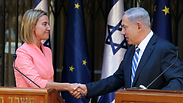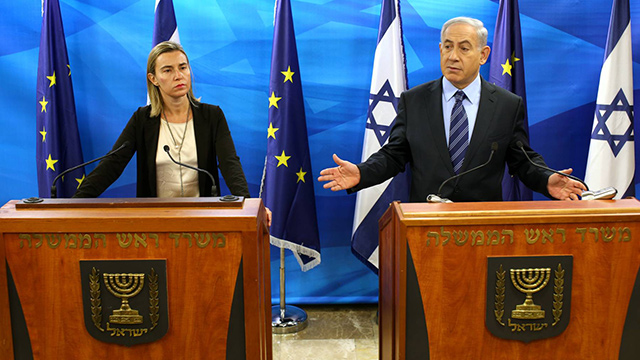
Netanyahu suspends diplomatic dialogue with EU
In response to EU decision to label Israeli settlement products, the prime minister instructed the Foreign Ministry to reevaluate the EU's involvement in peace efforts with the Palestinians.
Prime Minister Benjamin Netanyahu instructed the Foreign Ministry on Sunday evening to suspend contacts with European Union representatives regarding the political process with the Palestinians to protest the bloc's decision to label Israeli exports from the West Bank.
The Foreign Ministry said that Netanyahu had ordered contacts frozen until a "reassessment process is completed." It did not go into detail as to which institutions are affected.
The move came in response to a decision made by the EU to label "settlement products" produced by Israelis in the West Bank, East Jerusalem and the Golan Heights.

The EU does not recognize the legitimacy of Israel's presence in the West Bank, Gaza, East Jerusalem and the Golan Heights, territories captured by Israel in the 1967 Six-Day War. As such, goods from there cannot be labelled "Made in Israel" and should be labelled as coming from settlements, which the EU considers illegal under international law.
The EU says the labeling policy aims to distinguish between goods made inside the internationally accepted borders of Israel and those outside.
Drawn up over three years by the European Commission, the guidelines mean Israeli producers must explicitly label farm goods and cosmetics that come from settlements when they are sold in the European Union. The EU guidelines aren't expected to necessarily apply to Israeli industrial or electronic products, or to non-fresh foods.
Netanyahu called the decision "hypocritical," saying it was indicative of a double standard. "The EU has decided to label only Israel, and we are not prepared to accept the fact that Europe is labeling the side that is being attacked by terrorism," Netanyahu said earlier this month. "The Israeli economy is strong and will withstand this; those who will be hurt will be those Palestinians who work in Israeli factories. The EU should be ashamed."
Officials at the Foreign Ministry clarified that while Israel continues its diplomatic cooperation with European countries such as Germany, Britain and France, it will not continue working with the European Union itself.
As part of its fight against the EU decision, Israel decided to take measures against 16 European countries: the United Kingdom, France, Spain, Denmark, Ireland, Croatia, Malta, the Netherlands, Sweden, Portugal, Slovenia, Italy, Luxembourg, Austria, Belgium and Finland.
The measures include summoning the ambassadors of the 16 countries to the Foreign Ministry for an official rebuke; and restricting meetings between ambassadors and senior Israeli officials to low-level government staffers.
This will naturally diminish the influence those ambassadors will have in their role. The visits of foreign representatives from the countries concerned will also be restricted, with their meetings unlikely to include time with the prime minister or the president.
Furthermore, the government will be far stricter regarding entry of foreign delegations to the West Bank and the Gaza Strip. In certain situations, their entry may even be denied.
Israel will also be stricter about which EU projects it permits in the West Bank and the Gaza Strip. For the EU, these projects are designed to give them footing and influence in the area.
 |
Reuters and the Associated Press contributed to this report.










